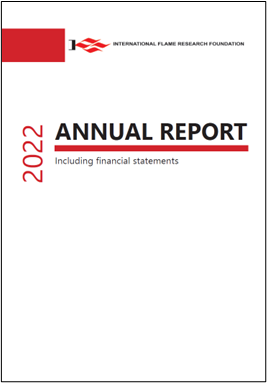-
IFRF publishes its 2022 Annual Report
Date posted:
-
-
-
Post Author
Greg Kelsall
-
-

The IFRF annual report for 2022 has now been published and is available as a downloadable PDF from the IFRF website.
The report opens with a review from Sauro Pasini, IFRF’s President, drawing the analogy between IFRF’s progress during 2022 with following a narrow and dangerous mountain path. This reflects the reduced interest in conventional combustion processes and their almost total abandonment in the electricity generation sector, at least in the OECD world, coupled with a consequent reduction in the number of IFRF members and the resulting available budget. Despite this, progress has been made in the reactivation of the network, successful meetings held on specific topics, with high quality participation, both in terms of numbers and interest in the discussions. Sauro further comments that even fuels that do not contain polluting carbon can burn and generate heat, to be used in industrial processes or in engines for mobility. In these sectors which are strategic for decarbonisation, the IFRF can make a significant contribution by encouraging interaction between the specialists present and among its members.
Greg Kelsall, IFRF’s Executive Director, then provided more details on IFRF’s activities during 2022, which included the first Topic Orientated Technical Meeting (TOTeM 48) since February 2020. This was a face-to-face meeting held on the 13th October at Air Liquide’s Paris campus, entitled ‘Hydrogen for decarbonisation’. TOTeM 48, an official side event of the European Hydrogen Week 2022, proved to be a great success attracting a record 110 participants from 13 countries.
IFRF were also invited by the Combustion Institute to organise one of two Industry round tables at the 39th International Symposium on Combustion held in Vancouver in July 2022. IFRF were able to gather representatives of industrial sectors, responsible for a large share of industrial emissions of greenhouse gases, to exchange with the participants. The roundtable was hybrid in nature due to ongoing travel restrictions in some locations, but it still attracted some 150- 200 participants attending in person, with more joining virtually.
In addition, IFRF’s Preferred Research Partner (PRP) network was expanded to six organisations, with Air Liquide in France and Glass Futures in the UK becoming the fifth and sixth PRP organisations, both in June 2022. The PRP network provides test facilities and expertise to IFRF members and supporting organisations giving them preferential access.
In terms of membership, Glass Futures joined as an academic member and a number of organisations in France, namely Cetiat, Cerfacs, IFP Energies Nouvelles (IFPEN) and Babcock Wanson agreed to join as members starting from January 2023. Additionally, the German Flame Committee with 14 members, who had suspended payment of their membership fees in 2021, agreed to return as a fee paying IFRF National Committee from 2023. This was at a reduced rate however, pending continued development of the IFRF offering, to be reviewed at the next German Flame committee meeting in September 2023.
The report also included the financial statements for IFRF, where the turnover in 2022 was £48,800 compared with £63,880 in 2021. Reduced operating costs of £46,283 during 2022 however resulted in a small net surplus for the year of £2,081. When added to the previous year’s reserves of £5998, this brings the total reserve for IFRF at 31/12/2022 to £8,079.
Overall, it has been an encouraging year of consolidation for IFRF with the first signs of recovery. With a strong programme of events for 2023, coupled with the member organic growth in France and the return of the German Flame Committee, the future looks positive for the Foundation.
On behalf of IFRF, we would like to say a big thank you to everyone who participated in our activities during 2022 and we look forward to your continued support in 2023 and beyond.
